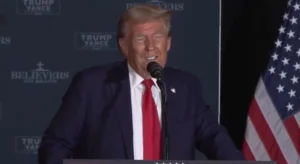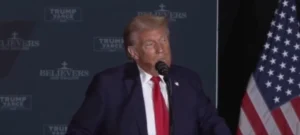Trump’s Claims of UK Labour Party Election Interference: Political Allegations: A Deep Dive
Trump’s Claims of UK Labour Party Election Interference: A Deep Dive into Political Allegations
 Former President Donald Trump topped the political news cycle last week for suggesting the UK Labour Party is involved in interference and meddling in the 2024 US elections. This assertion has drawn reactions from some political analysts, commentators, and party officials from all quarters. What Trump claims, the context in which it took place and its impact in both U.S. and UK politics are examined in this article.
Former President Donald Trump topped the political news cycle last week for suggesting the UK Labour Party is involved in interference and meddling in the 2024 US elections. This assertion has drawn reactions from some political analysts, commentators, and party officials from all quarters. What Trump claims, the context in which it took place and its impact in both U.S. and UK politics are examined in this article.
Trump’s Allegations – understood
 At a rally in Georgia Tuesday, Trump claimed the Labour party in the UK is conspiring to derail U.S. elections against him. This, he said, was an orchestrated campaign to undermine his candidacy and sway American voters in support of his political opponents. There has been little to no concrete evidence to support what these claims are exactly, and thus have flirted with skepticism among political analysts.
At a rally in Georgia Tuesday, Trump claimed the Labour party in the UK is conspiring to derail U.S. elections against him. This, he said, was an orchestrated campaign to undermine his candidacy and sway American voters in support of his political opponents. There has been little to no concrete evidence to support what these claims are exactly, and thus have flirted with skepticism among political analysts.
That comes as election meddling is again in the spotlight, with investigations under way into Russia’s alleged 2016 interference in the presidential race. Still, his comments fit into a larger theme of presenting his political feuds as affairs of the outside world, not ones of party machination or popular will.
Contextual Background
This all comes at a time of strained politics in both the U.S. and the UK. But in the U.S., the race to be the Republican party’s presidential nominee is in the grabs of a crowded field of candidates, and Trump faces very big challenges. Over in the UK, meanwhile, the Labour Party has begun preparing for its own electoral clashes, with leader Keir Starmer trying to position his party as a credible, likely vote-winning, alternative to leader of the Conservatives Boris Johnson.
But it’s especially interesting that Trump’s remarks come at such a key moment on both countries’ respective calendars. During election campaigns, foreign influence and election integrity stories will likely grow louder as both parties look to the future at the polls.
Political Figures’ Reactions
UK politicians have rushed to respond. Labor officials have said Trump’s accusations are baseless and politically motivated. They say these allegations take attention away from issues that matter to voters and rocks the democratic process.
However, some Republican allies regurgitate Trump’s words urging election integrity and foreign interference, calling them part of a plausible story. This division points to the extent to which Trump’s rhetoric lingers with some Republicans in the party even as it repels others who favor coherent and evidence oriented discourse.
Implications for U.S.-UK Relations.
 The allegations could embolden Trump to take aim at other U.S. alliance partners, such as the U.K. Both countries historically have had what their spymasters often describe as a ‘special relationship,’ based on friendly cooperation in virtually every area from trade to security to intelligence sharing. But even that can strain diplomatic ties and make for less successful collaborative efforts.
The allegations could embolden Trump to take aim at other U.S. alliance partners, such as the U.K. Both countries historically have had what their spymasters often describe as a ‘special relationship,’ based on friendly cooperation in virtually every area from trade to security to intelligence sharing. But even that can strain diplomatic ties and make for less successful collaborative efforts.
With such politically charged waters to tread through as leaders of both countries, it’s important that they don’t lose sight of the open lines of communication without which misunderstandings could easily turn into tension.
Media and Misinformation in Role
Trump’s claims in an age of misinformation thrumming across social media platforms highlight how important journalism and media literacy is for the public. These allegations have already been fact checked by fact checking organizations who are aware of the value of good report and the need for this to shape the public opinion.
Left to its own devices, a political statement is only half of the equation; it falls to Media outlets to contextualize the statement and serve as the source of fact. Therefore, such people must be watchful against sensationally leading perception of reality astray.
Voter Sentiment
Generally different demographics will react differently to Trump’s claims. The polling data makes clear some voters may find himself sympathetic to his victimization by foreign powers story, others are likely to see the accusations as a way to distract from pressing domestic concerns, such as inflation, healthcare or immigration.
For both sides of the campaign, understanding where the voter is will help them prepare for the upcoming elections. Candidates best able to explain to constituents how to navigate the more complicated narrative about foreign influence may come out on top at the polls.
Looking Ahead: The 2024 Elections
The Trump allegations about UK interference, while considering how the state of play in global politics can so braided as in local electoral dynamics as we approach the 2024 elections. Part of being a candidate is also about perceptions of foreign involvement in your campaign.
The build up to the election will create both an opportunity and pressure for both parties to develop messages that appeal to the demographics they must reach across the voting season, while at the same time countering narratives that might be seeded during the campaign. As accusations swirl, candidates will have to build some trust with their constituents without transparency or accountability.
Conclusion
Trump’s major claims of an alleged UK Labour Party interference takes the already contentious electoral landscape up yet another level. And now that political figures on both sides are responding to these assertions, it’s critical for voters to be critical when engaged with information being presented to them.
We’ll have yet another reminder as we head toward now how domestic politics interplays with international relations. We can help facilitate more informed discussions anchored in fact rather than conjecture for a more healthy democratic process of truth over shock.
In other words, as we move through this shifting political landscape full of accusations and rebuttal from all sides, we must put integrity and transparency at the forefront of all that we do.
